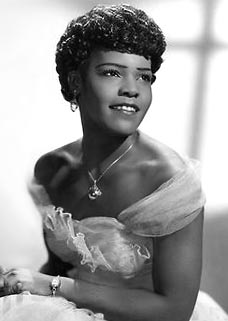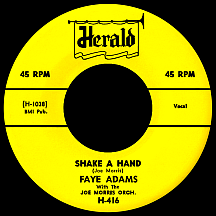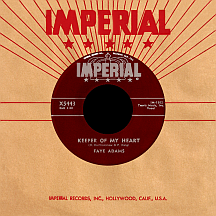FAYE ADAMS
Shake a Hand
"Extraordinary vocal power" is an appropriate phrase to describe the talent of singer Faye Adams. She made a spectacular first impression with "Shake a Hand," composed by her bandleader, Joe Morris; its positive message ('Your troubles I'll share...let me know and I'll be there...I'll take care of you...any place and anywhere...') contains sentiments in line with Faye's churchgoing background ('I've said all I have to say...except don't forget to pray...and shake a hand every day'). A number one R&B hit from September to November '53 and eventual million seller, the song resonated with millions in the black community and has been recorded successfully by several other artists starting with a country cover by Red Foley released within weeks of Adams' original; versions by Philly group The Mike Pedicin Quintet (in 1958), LaVern Baker (in '60), Ruth Brown (in '62) and duet team Jackie Wilson and Linda Hopkins (in '63) impacted the national record charts. Still, it's Faye's dynamic recording that best stands the test of time...and it wasn't her only major hit.
Born Fanny Tuell in Newark, New Jersey, she grew up singing in church and at age five began performing spirituals on local radio broadcasts with her two older sisters. In 1942 she married Tommy Scruggs, a marginally successful jazz musician who convinced his 19-year-old bride to try making it in the wicked world of the big bands. By decade's end she was getting regular gigs at small New York City nightclubs using the name Fay Scruggs, though numerous attempts at getting a recording career off the ground had fallen flat. She started performing up and down the eastern seaboard and happened to catch Ruth Brown's attention during an appearance at a club in Atlanta.
Brown, apparently unconcerned about any potential for serious competition from this compelling but similar artist, helped get her an audition with trumpeter Morris, who'd been a member of Lionel Hampton's band and several others before starting his own group in 1946. He'd rubbed elbows with Ruth at Atlantic Records for a few years while notching a chart-topping R&B hit in 1950 with "Anytime, Any Place, Anywhere" featuring shrill-but-appealing vocal stylist Laurie Tate. When Tate split to take on the domestic challenge of being a wife and mother, he replaced her with the strong booming sound of Scruggs' deep alto. The first outing was "That's What Makes My Baby Fat," a humorously tacky Atlantic single by the Joe Morris Blues Cavalcade, with Fay singing while Joe talks jive about his gluttonous eating binges ('...a whole lotta chewin', that's all I care about doin'!') set to a rhythmic melody similar to the 1938 Chick Webb/Ella Fitzgerald classic "A-Tisket A-Tasket." Fay's funny food-addiction ditty wasn't a hit by any stretch...which turned out to be a blessing.
Joe's contract with Atlantic expired in 1953. He took his impressive new lead singer and signed on with the smaller Herald label run by Al Silver, who was so taken with Miss Scruggs that he gave her a separate solo contract and changed her name to something a little more streamlined: Faye Adams. Then "Shake a Hand" hit big, a boon for all involved. Atlantic's Herb Abramson realized he'd underestimated her potential and immediately released "Sweet Talk," another of Morris's singing/talking novelties (and guilty pleasures!), under the Faye Adams name. But it was too late; the public had developed a different opinion of the diva. The next Herald single, "I'll Be True" (also penned by Morris), ramped up the tempo and landed at number one R&B a few weeks into the new year. Faye was suddenly nudging Atlantic's top female star, Ruth Brown (who'd been so nice about helping her career get off the ground), out of the spotlight!

"Atomic Adams!"...that's what they called her! In person, Faye was unassuming, somewhat reserved...but in the grooves of her records she was something else entirely. The next single was "Every Day," a song written not by Morris but William McLemore. Reprising the "Shake a Hand" prototype, it was performed by Faye in the movie Rhythm and Blues Revue (a star-studded slice of cinema with Count Basie, Joe Turner, Sarah Vaughan, Nat "King" Cole, Amos Milburn, The Larks, Brown and Hampton all scuffling for screen time), which appeared in theaters the following year. The single stiffed, which must have startled the Herald heads who'd expected something more dominant considering its one-two-punch lead-in. The more energetic "Somebody Somewhere" ('...must be prayin' for me...') disappeared like its predecessor until Faye showed up singing it in another film, 1956's Basin Street Revue.
Not to worry...yet. "Hurts Me to My Heart," a Charles Singleton-Rose Marie McCoy song delivered by Faye with a take-no-prisoners attitude (minus Morris), hit the charts like gangbusters and spent several weeks at number one in the fall of 1954. But this third triumph preceded a steep decline. Eight good but non-hit singles appeared on Herald over the next two years (standouts: "Teen-Age Heart," a Ruth Kardon-Hal Gordon-Alan Freed ballad, and brass-infused jumper "Takin' You Back"). Maybe rock and roll's emergence with Elvis and his legion of like-minded counter-culturists was causing some adverse effect; besides, Faye was well into her thirties by that time, more a curse then than now. She left the label after doing a version of "Anytime Anyplace Anywhere," the song Joe Morris and long-gone Laurie had rocketed to the top several years before. She and Morris had no further opportunities to work together; he developed a cerebral hemorrhage and tragically passed away in 1958 at age 36.
Moving to Imperial Records, she worked with Fats Domino's main man Dave Bartholomew and made her first chart appearance in more than two years with spring 1957 label debut "Keeper of My Heart." But the Imperial deal ran its course quickly. She bounced around for a few years, waxing a couple of singles for the Lido label in 1959, "It Made Me Cry," an early John Berry-Don Covay effort, and "It Can't Be Wrong," a sophisticated pop tune. Warwick Records president Morty Craft sought to revive the careers of several past R&B stars (Larry Darnell, Shirley and Lee, Bull Moose Jackson, Louis Jordan and others) with varying degrees of success; Faye's was one such pet project that couldn't get a foothold. Singles for Savoy in '61 ("Step Up and Rescue Me") and Prestige in '62 (swan song "You Can Trust in Me") were produced with more contemporary '60s-style arrangements, a logical move but one that didn't fit with Adams' dated approach.
Perhaps such incredible success followed by a long series of failures was interpreted by Faye as a sign from God; she went back to New Jersey, settled in Englewood and remarried, choosing to be known simply as Fanny Jones while singing gospel music in church as she had at the beginning...just not professionally. While many still treasure the hits and other "worldly" recordings of Faye Adams, she has long since closed the book on that part of her life.



